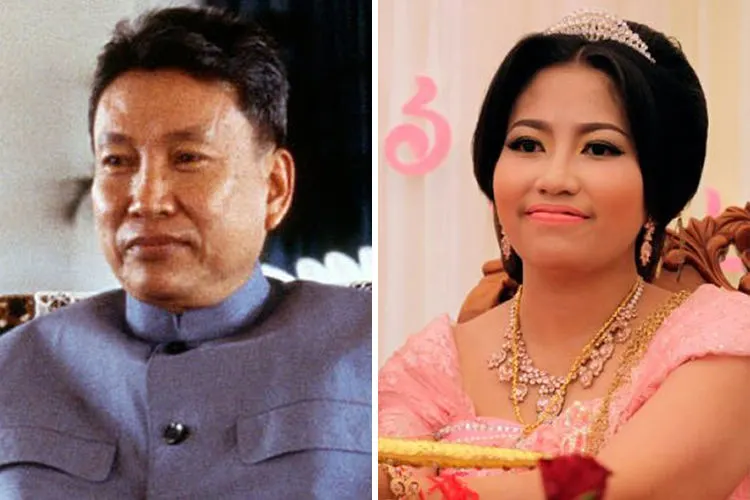Sar Patchata, the daughter of notorious Khmer Rouge leader Pol Pot, has lived a life both extraordinary and shrouded in mystery. Her story offers a captivating glimpse into the impact of a dark historical legacy on one family and the complexities of navigating personal identity amidst unimaginable atrocities.
Growing Up in the Shadow of a Dictator
Born in 1986, Sar Patchata spent her early years shielded within the shrinking territory controlled by the brutal Khmer Rouge regime led by her father. Details about her childhood are scarce, but accounts suggest an isolated existence marked by secrecy and fear.
After Pol Pot’s death in 1998, Patchata, along with her mother, Mea Son, made the significant decision to defect to the Cambodian government. This marked a turning point, implying a desire to break free from the shadow of her father’s legacy and forge a new path.
A Life Unveiled: Education, Marriage, and Lingering Questions
Rejecting a life defined by her past, Sar Patchata pursued higher education, eventually earning a Master’s degree in English Literature in Malaysia. This pursuit of knowledge speaks to a determination to create her own identity separate from her father’s horrific acts.
In 2014, she married Cambodian businessman Sy Vicheka in a lavish ceremony held in Banteay Meanchey province, a location deeply entwined with the Khmer Rouge’s history. The event sparked debate, with some interpreting it as a sign of healing and progress, while others questioned its timing and symbolism.
Throughout these significant life events, Sar Patchata has remained remarkably private, avoiding public statements about her father or her experiences. This silence, understandable given the circumstances, nevertheless raises intriguing questions:
- What is it like to grapple with the immense weight of a parent’s horrific actions, especially on a national scale?
- Do the children of dictators bear any responsibility for their family’s past?
- Does silence equate to complicity, or can it be a coping mechanism for processing trauma and navigating a complex personal history?
Cambodia’s Unfinished Reckoning
Sar Patchata’s life unfolds against the backdrop of Cambodia’s ongoing struggle to heal from the deep wounds inflicted by the Khmer Rouge. The Extraordinary Chambers in the Courts of Cambodia (ECCC) continue to seek justice for the atrocities committed during that period. However, the scars of the past run deep, and the question of how a nation reconciles with such profound suffering remains.
While Sar Patchata’s story offers no easy answers, it serves as a powerful reminder that the legacy of the Khmer Rouge extends far beyond the history books. It is a living narrative, embodied in the lives of those who lived through those harrowing times and the generations that followed. Her decision to live a quiet life, seemingly detached from her father’s legacy, highlights the complex interplay of personal choice, historical responsibility, and the enduring impact of trauma.
What Happened to Pol Pot’s Family?
The fate of Pol Pot’s family offers a broader perspective on the lasting ramifications of his regime.
- Mea Son, Pol Pot’s second wife, was apprehended by Vietnamese forces in 1979, but later rejoined her daughter after defecting to the Cambodian government.
- Pol Pot’s brother-in-law, Ieng Sary, a high-ranking Khmer Rouge figure, was sentenced to life in 2014 by the ECCC for his role in the genocide. His wife, Ieng Thirith, faced similar charges but died in 2015 before her trial concluded.
The stark contrast between Sar Patchata’s life—marked by education, a high-profile marriage, and relative anonymity—and the fate of other family members entangled in the Khmer Rouge’s machinery of death underscores the multifaceted legacy of this brutal regime. It also compels us to consider the varying degrees of accountability and the challenges of achieving true justice and reconciliation in the aftermath of unimaginable crimes.
Exploring Further:
For a deeper understanding of the Khmer Rouge era and its lasting impact, consider these resources:
- Did you know about the upcoming Regin Watter calendar? Check it out!
- If you ever had an Awkward bulwark in room, you should read this.
- Check out the Moonlander read if you have some time.
- Ever heard about The Bobby Weir incident?
By shedding light on the often-overlooked experiences of those connected to perpetrators of mass violence, we gain a more nuanced and complete understanding of history’s complexities. Sar Patchata’s life, though shrouded in secrecy, offers a valuable entry point into these difficult conversations.
- China II Review: Delicious Food & Speedy Service - April 17, 2025
- Understand Virginia’s Flag: History & Debate - April 17, 2025
- Explore Long Island’s Map: Unique Regions & Insights - April 17, 2025
















